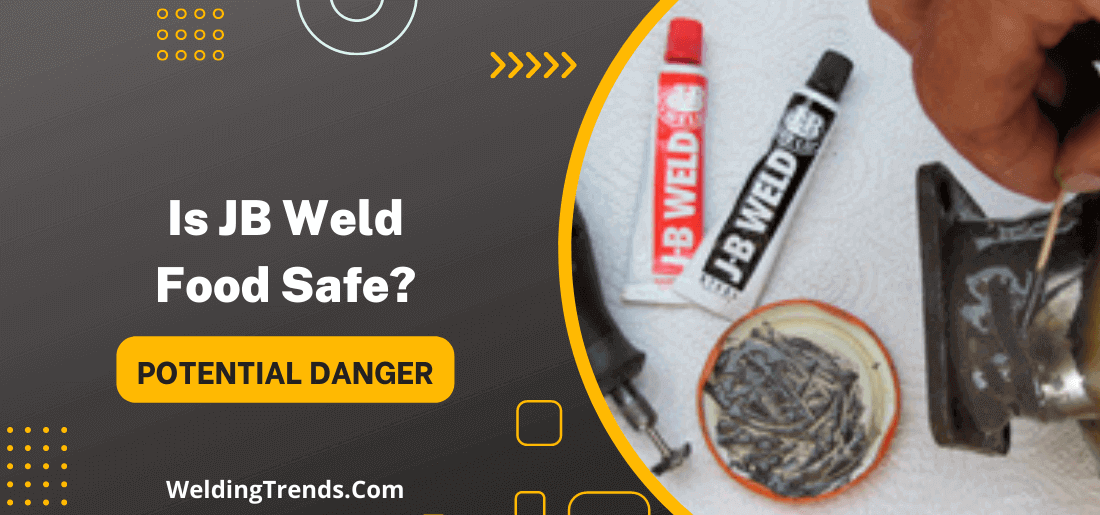Welding is a process of fusing two pieces of metal by heating them to the point where they liquefy and then merge. JB weld is a popular choice for do-it-yourselfers when it comes to home repairs.
But is JB weld food safe? The answer may surprise you. While JB weld is non-toxic and will not harm you if ingested, it is not meant for human consumption.
So if you’re using a JB weld to repair something that will come into contact with food, such as a food container or kitchen appliance, be sure to avoid ingesting any of the JB weld residues. Otherwise, you may end up with an upset stomach.
What is JB weld and what are its uses?
JB weld is a two-part epoxy that can be used to bond metal, plastic, ceramic, glass, and more. It’s frequently used in repairs around the home, such as fixing cracked dishes or mending broken pipes. JB weld can also be used to build up missing metal on engine parts or to make custom jewelry.
JB weld is a two-part epoxy adhesive that sets in just 4-6 minutes and cures fully in 15-24 hours.
is jB weld epoxy food safe?
Yes, JB Weld is food safe once it has fully cured. It is not recommended for use on cookware or eating utensils, however. The FDA has approved JB Weld for food contact, but not for prolonged or direct contact with food.
It is safe to use on food containers and preparation surfaces as long as it is fully cured and there is no chance of leaching into the food. If you are concerned about safety, always test a small area before using JB Weld in the kitchen.
Also, be sure to read the instructions on the JB Weld package before use. Some products are not meant for direct food contact. If you have any doubts, it is always best to err on the side of caution and avoid using JB Weld in the kitchen altogether.
some potential dangers of using JB weld in the kitchen
JB Weld is not intended for use in the kitchen, as it is not food-safe.
Some of the potential dangers of using JB weld in the kitchen are:
- The fumes from JB Weld are not safe to inhale and can be dangerous if inhaled in large quantities.
- JB Weld is not food-safe, so if it comes into contact with food, it could contaminate the food.
- If JB Weld is used to repairing a kitchen appliance or utensil, it could potentially leach chemicals into the food that is prepared using that appliance or utensil.
- JB Weld is not heat-resistant, so if it is used to repair a cooking appliance or utensil, it could potentially melt and release toxic fumes.
- If JB Weld is used to repairing a kitchen sink, it could potentially leach chemicals into the water that is used for cooking and cleaning.
How do you clean up a JB weld spill in the kitchen?
To clean up a JB weld spill in the kitchen, you need to follow these steps:
- Use a putty knife to scrape up as much of the spill as possible.
- Vacuum up the debris.
- Clean the area with a damp cloth.
- Apply a cleaner specifically designed for JB weld spills.
- Rinse the area with water and dry it off.
Following these simple steps should help you clean up a JB weld spill in your kitchen quickly and easily.
8 ways to seal food-safe containers without using JB weld
There are many other options available to seal food-safe containers:
1) Use a food-grade epoxy
With a food-grade epoxy, you can create a water-tight seal that will hold up against both hot and cold temperatures. Simply mix the epoxy according to the instructions on the packaging, apply it to the area you wish to seal, and allow it to dry.
2) Food-grade silicone
Silicone is another option for sealing food-safe containers. It can withstand high temperatures, making it ideal for sealing containers that will be used for storing hot liquids. To use silicone, simply apply a bead of it around the area you wish to seal and allow it to dry.
3) Heat-activated tape
Heat-activated tape is designed specifically for sealing food-safe containers. The tape works by melting when it comes into contact with heat, creating a seal that is both air-tight and water-tight. To use heat-activated tape, simply apply it to the area you wish to seal and run a hot iron over it.
4) Use paraffin wax
Paraffin wax is another option for sealing food-safe containers. Simply melt the wax and brush it onto the area you wish to seal. The wax will harden as it cools, creating a water-resistant barrier.
5) Shrink wrap
Shrink wrap can also be used to seal food-safe containers. Simply place the shrink wrap over the top of the container and use a heat gun to shrink it down. The shrink wrap will form a tight seal around the container, keeping air and moisture out.
6) Use aluminum foil
Aluminum foil can be used to create a makeshift seal for food-safe containers. Simply place a sheet of aluminum foil over the top of the container and press it down so that it forms a tight seal. The aluminum foil will keep air and moisture out, keeping your food fresh.
7) Vacuum sealer
If you want to create an air-tight seal, a vacuum sealer is your best bet. Vacuum sealers work by removing all of the air from a container and then sealing it shut. This will keep your food fresh for much longer than other methods of sealing.
8) Canning method
If you are sealing food-safe containers for long-term storage, canning is the best option. Canning involves boiling the containers to kill any bacteria that may be present and then sealing them shut.
This will create an air-tight seal that will keep your food safe for months or even years.
FAQs – Is JB weld food safe?
Can you use JB weld to fix a leaky faucet or a broken pipe?
No, JB Weld is not intended for use on plumbing fixtures. If you use JB Weld to try to fix a leaky faucet or a broken pipe, it could potentially make the problem worse and cause further damage.
Is J-B Weld safe for drinking water?
No, J-B Weld is not safe for drinking water. The chemicals in J-B Weld can leach into water and potentially cause health problems.
If you need to repair a leak in a drinking water pipe, we recommend using a product that is specifically designed for that purpose. There are many products on the market that are safe for drinking water applications.
Does J-B Weld contain BPA?
No, J-B Weld does not contain BPA. Because of its unique composition, J-B Weld is not known to contain any harmful chemicals.
However, we always recommend that you consult with your local hardware store or plumber to ensure compatibility before using J-B Weld on your project.
Can J-B Weld be used inside an oven?
Yes, J-B Weld can be used inside an oven. However, it is important to note that the J-B Weld should not come into direct contact with food.
Additionally, the area around the repair should be well-ventilated to avoid fumes.
Is J-B Weld extreme heat toxic?
There is no definitive answer to this question since it depends on a variety of factors, including the specific composition of the J-B Weld product and the amount of exposure to extreme heat.
However, in general, J-B Weld products are considered safe for most applications. If you are concerned about potential toxicity, it is always best to consult with a medical professional before using any product.
Can you use J-B Weld on a grill?
Yes, you can use J-B Weld on a grill. It is a high-strength epoxy that can be used to repair metal and other surfaces.
It is heat resistant and can withstand temperatures up to 500 degrees Fahrenheit. It can also be used to repair cracks in the grill grates. J-B Weld can be found at most hardware stores.
Is J-B Weld toxic to animals?
As far as we know, J-B Weld is not toxic to animals. We have not heard of any reports of adverse effects on animals after using our products.
If you are concerned about your animal’s safety, we recommend that you consult with a veterinarian before using any product around your animal.
Conclusion:
JB weld is a food-safe adhesive and can be used to seal food containers. It is also non-toxic, so it will not harm you if you happen to ingest it.
JB weld is a great option for repairing food containers because it creates a watertight seal that will keep your food from spoiling.
It is an FDA-approved product that will not leach any harmful chemicals into your food. Have you ever tried using JB weld to fix something in your kitchen?




